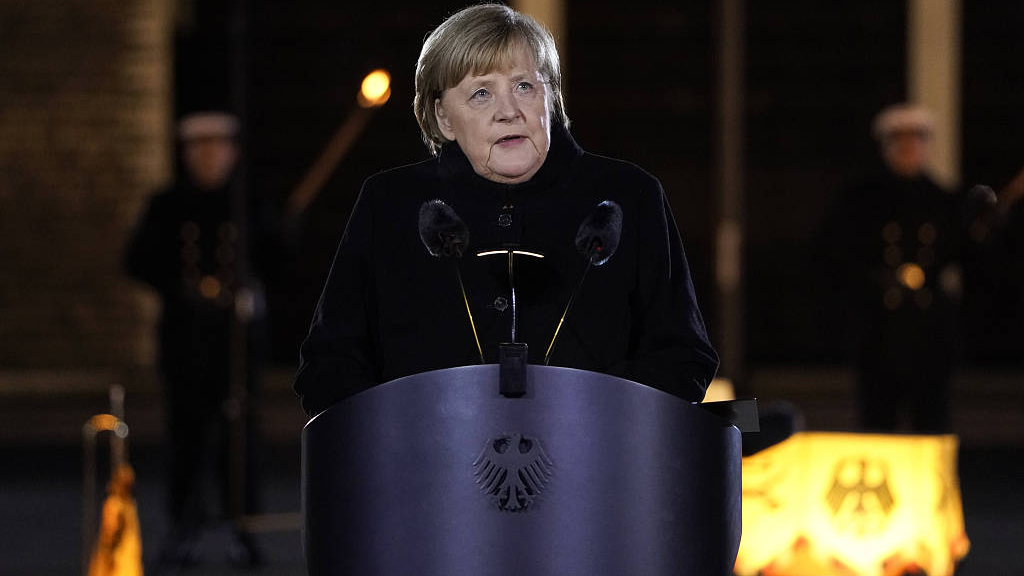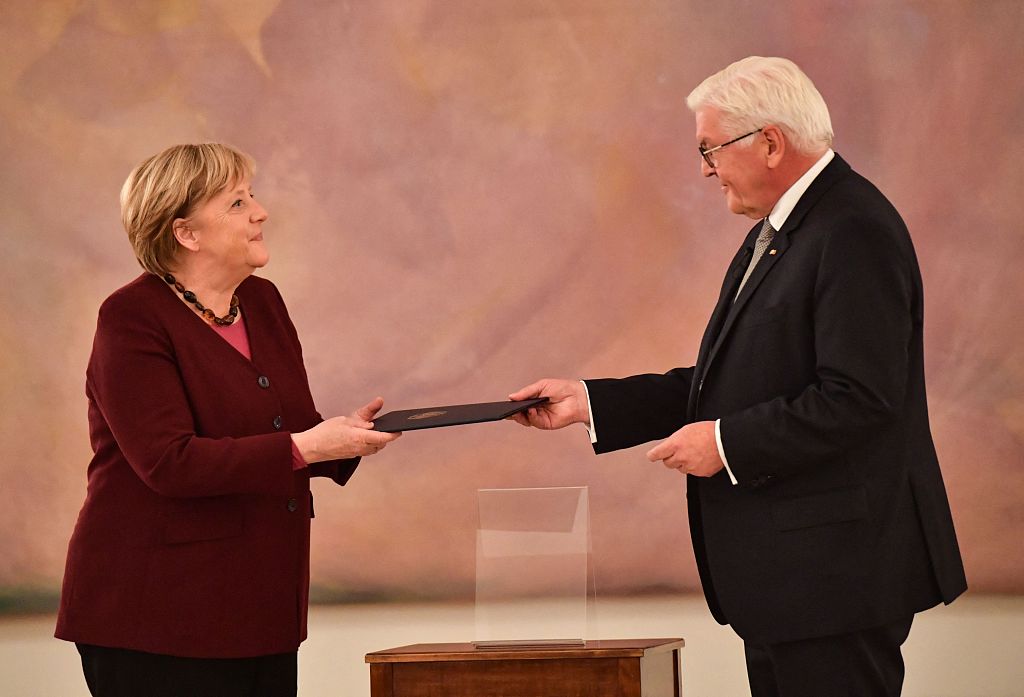
Outgoing Chancellor Angela Merkel attends a military torch farewell ceremony in Berlin, Germany, December 2, 2021. /CFP
Outgoing Chancellor Angela Merkel attends a military torch farewell ceremony in Berlin, Germany, December 2, 2021. /CFP
Editor's note: Hamzah Rifaat Hussain, a former visiting fellow at the Stimson Center in Washington and former assistant researcher at the Islamabad Policy Research Institute, is a TV anchor at Indus News in Pakistan. The article reflects the author's opinions and not necessarily the views of CGTN.
German Chancellor Angela Merkel's legacy as one of the world's most revered figureheads is assured as she ends 16 years in office with star-studded farewell military honors in Berlin. The ceremony, the accolades and the praise epitomized what her policies and diplomacy have left behind domestically and globally in light of severe polarization, long-running conflicts and strategic misgivings.
It was fitting that the "Grosser Zapfenstreich" or the highest military ceremony for German civilians was awarded to her as she urged German citizens to approach life with a "lightness of heart" and optimism about the country's future.
That lightness of heart certainly manifested itself in the diplomatic arena as under Merkel, German foreign policy was characterized by shrewd diplomacy, an open border policy of accommodation and economic and public initiatives that ensured that Berlin retains its reputation as one of the most prominent capitals in the world.
As per foreign policy expert Daniel Hamilton, Merkel adopted a measured approach in handling the country's affairs that translated into consolidating the European Union as a bloc in difficult times during which growing populism, isolationism and unilateralism characterized the global landscape. Her diplomacy became an important outlier as she displayed incredible maturity in handling diplomatic affairs. Beyond the EU, her partnerships with countries across the Atlantic and in Asia demonstrated an unwavering commitment to multilateralism and unconditional cooperation that synergized gains and minimized losses for countries.
Viewed retrospectively, Merkel's personal transformation was remarkable given the fact that she grew up in a fragmented country behind the Iron Curtain that was divided by ideology. She then became a symbol of a unified Germany, which was otherwise beset by its Nazi legacy, while instilling hope that Berlin would redress its past and contribute positively to global cooperation.

German Chancellor Angela Merkel is handed the certificate of dismissal by German President Frank-Walter Steinmeier during an official ceremony at the presidential Bellevue Palace in Berlin, Germany, October 26, 2021. /CFP
German Chancellor Angela Merkel is handed the certificate of dismissal by German President Frank-Walter Steinmeier during an official ceremony at the presidential Bellevue Palace in Berlin, Germany, October 26, 2021. /CFP
In subsequent years defined by hegemonic designs and interventionism from the United States in conflict zones, Germany stood out as a calming voice and a champion of de-escalation and restraint. By forging bilateral partnerships and respecting state sovereignty as compared to brazenly violating it, Berlin forged amicable relations with countries such as China in the absence of provocations, fostering unconditional cooperation.
Domestically and in a Pan European context, Merkel encountered a pandemic era with Europe as one of the most affected continents in the world. Her support for the EU's pandemic recovery fund of 800 billion euros, however, allowed the bloc to raise common debt in capital markets despite fierce opposition domestically and prevented the bloc from capitulating. Her foreign policy was characterized by collectivism while ensuring that the spirit of solidarity does not fall prey to petty politics.
Hence, it should come as no surprise that as per previous Pew polls, Merkel consistently ranks as the most trusted world leader and was previously christened with the title "leader of the free world" across the Atlantic during the presidency of Donald Trump. Unlike American diplomacy, which adopted a reductionist approach internationally, Merkel made several compromises at key platforms such as the G20 summit, the G7 and the EU itself that went against the trends of degrading meaningful engagements between sovereign states.
Another factor contributing to her positive profile was Germany's response to the refugee crisis, upholding German values as an all-inclusive and accommodative nation catering to humanitarian considerations and endearing her to refugees and migrants of Syrian, Afghan and Iraqi origin. The open border policy may have been castigated domestically as being too soft but with conflicts continuing unabated, Merkel resorted to humanitarianism instead of protectionism.
Under Merkel, Germany did not get entangled in great power rivalries instigated by the United States in geographical locations such as East Asia where the diplomacy pursued was less about exhibiting bravado and focused on fact-based, prudent judgments with a refusal to be lured into the dangerous world of misinformation and hybrid warfare which sours ties and jeopardizes constructive engagements. Pushing through with the China-EU investment deal and not conditioning it on sovereign dynamics is one such example of successfully transcending geopolitics.
The challenge for subsequent chancellors, however, would be to ensure that such trends persist. On merit alone, Angela Merkel goes out as one of the world's most respected leaders.
(If you want to contribute and have specific expertise, please contact us at opinions@cgtn.com.)

